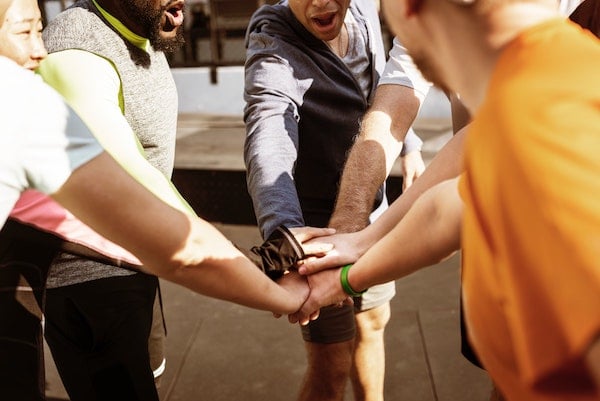Published on
How A Community-Based Organization Model Can Transform the Role of a University

The role of higher education institutions is changing as they start to play a more expansive role in their communities, both in terms of economic growth and supporting quality of life. For Marc Levin, who was recently appointed president at Maryland University of Integrative Health (MUIH), reimagining this role—particularly within the scope of his unique institution—presents an exciting opportunity. In this interview, Levin expands on the opportunities and challenges before MUIH and reflects on how institutions must evolve to serve the emerging needs of their professional and regional communities.
The EvoLLLution (Evo): Before stepping into your current role, you served as MUIH’s CFO. What did you learn as a CFO that you expect to support you now that you’re in the role of president?
Marc Levin (ML):Typically, a CFO has a broad view of what’s going on across the organization. As such, CFO’s have a unique opportunity to learn about the entire organization in rich detail. As president, it’s a good starting point to have a robust understanding of the organization’s history, financial situation, the recent development and needs of the organization and the decisions that are made related to moving forward.
The other advantage of having been a CFO prior to becoming president is that you understand the realities of finances. You learn to evaluate resources—both financial and human—for any decision, and to establish priorities. A president who’s served as CFO is less inclined to make promises before evaluating what can be done based on the realities of the situation.
Evo: Has there been anything that’s surprised you, or that you weren’t expecting, as you’ve transitioned from CFO to president?
ML: I learned that there were many more wonderful things being done at the university than I knew about in detail including research, faculty presentations and involvement with outside organizations, community service, projects of students impacting health and wellness, and great work being done by our alumni. I’d like us to enhance the communication of these activities, both internally and externally, to tell our story and demonstrate the university’s amazing accomplishments.
Also, as president, you are viewed differently than a CFO by institutional staff and leadership. As CFO, suggestions, offers or ideas were typically interpreted as recommendations. As president, they are interpreted as directives, so I need to remind people they are not directives and I want discussion and feedback. I’ve also noticed that emails are responded to quicker since they are seen as urgent. I used to send out emails in the evening with the intent of talking about them the next day. Once I became president, I started getting responses immediately in the evening. I had to tell people I did not expect them to be working in the evening and I now compose the emails and set them up for delayed delivery in the morning.
I believe it is the responsibility of every leader and particularly the president to lead, inspire, and elevate. It’s important to recognize that people view you a little differently in everything you say and do as president—even though you’re the same person you were the day before. The great thing about that dynamic is every moment and every interaction is an opportunity to lead by example. How awesome is that?
Evo: Having significant experience within the organization, what unique market opportunities do you see for MUIH?
ML:We have a phenomenal growth opportunity here, especially in the field of integrative health, where there are very few other players. We have the broadest array of integrative health programs, degrees and offerings. We are top of our field in the world and we have growth opportunities in additional areas of integrative health. There are new degrees, new areas of concentration, and stackable credentials that can be offered and which are needed by integrative health and conventional medicine alike. In addition to the academic side, there’s also significant growth opportunities as we launch online professional and continuing education and expand our community education activities.
The vision I have for the school is that it is our responsibility to strive to impact the health, wellness and well-being of every person on the planet. At MUIH, we have brilliant and amazing faculty, staff, students and alumni who possess a tremendous amount of wisdom related to integrative health and we have a responsibility to disseminate that knowledge to impact lives. One of the ways to do this is clearly through students who graduate to become practitioners, educators or advocates to advance health and wellness in private practice, or in healthcare, social service, community, corporate or government settings. In these cases, our graduates can share what they have learned as they work in their respective fields. However, there are numerous other ways to reach people and have an impact, either directly or indirectly, by creating diverse access points for greater numbers of people—regardless of whether they’re pursuing a credential—to learn from us.
We want to be a leader in integrative health for practitioners, for researchers, for educators, for patients and clients, and for the general public. The growth opportunity for us is to be that international leader in health and wellness.
Evo: How do you plan to diversify MUIH’s program offerings to evolve the university into this new role? Will the university be creating new programing from the ground up, or leveraging unbundling and stacking to meet more students where they are?
ML:We are not starting from the ground up. We already have the expertise. MUIH’s sole focus is on integrative health approaches; this is our defining and differentiating area of mastery. The question is how do you break it out and segment it? How do you spread health and wellness traditions that are rising in the consciousness and practice of the general public? How do you put it in the appropriate format and the appropriate size? The appropriate distribution mechanisms to have that impact? We have the faculty expertise, skills and programing already. We need to think about how we can best use it to benefit others— by expanding, recombining, or breaking it down into smaller pieces.
Another aspect of achieving this vision is rethinking the organizational model. We are going to be implementing what I think is a unique organizational model—an authentic community. In this model we view all of our stakeholders as part of our community. Whether it’s an employee, a student, an alum, a faculty member, a patient or client in our clinic, a practitioner, our external partners, somebody that came to one of our programs, somebody that goes to our social media platform or someone who signs up for our email list, every stakeholder is a unique individual who we care about. We have a responsibility to share what we know and to positively enhance their health and wellness for as long as they want to be part of our community. Being a member of our community also means having a voice in the direction of the institution, and to that end all of these individuals have been asked to share with us their vision for MUIH which we believe is an inclusive and unique approach.
For instance, we will be giving our students information and opportunities that, while not necessarily tied directly to their particular degree, can help them grow as individuals. The idea is to become a real community and live up to that image by caring about everybody and taking a responsibility to enhance their lives in any way that we can, for as long as they’re part of our community. That’s what we’re going to be doing.
Evo: What are some of the key challenges that are going to stand in the way of executing on this vision?
ML:The challenges are similar to any organization. We have certain resources, whether it’s human resources—including the time and energy and people—or financial resources and we want to maximize our impact for the most number of individuals with the resources available. Establishing priorities has an impact on how quickly you can do things, so that’s the challenge.
Much of what I’m talking about doesn’t take a lot of financial resources but necessitates an operational recalibration.
One of the themes that I spoke to the community about is this idea of striving for greatness. But interestingly, I’ve never applied that philosophy to an organization where I worked until I came here. When I came here I thought, “This is an organization that should be great and can have a great impact on the world.”
We should be striving for greatness as a community and a university, whether it be our courses or clinical services, how we treat our students and employees, or the kind of culture we create. It’s very important to keep our “why” (of impacting people’s lives) in mind, especially when times get tough, the resources aren’t there, and we can’t move as quickly as we would like. Remembering that we want to improve lives can sustain our energy and persistence so that we keep moving forward and we never give up in making improvements.
Evo: What is it going to take, even operationally, to realize this shift in the role of the institution?
ML:I’m very excited about this, and there’s no question in my mind we will succeed in driving this transformation. To me, it’s obvious and I see it so clearly. It’s who we are, and it’s in our DNA. What I’m talking about is consistent with the core values of the organization—community, mindfulness, integrity, inquisitiveness, and discernment—and it is our responsibility to create this future. The focus is not just what we do but alsohowwe do it—how we interact with, advance and care about one another.
We’re going to achieve this through the passion, creativity, sense of purpose, experience and wisdom of the community. Our power lies in unleashing the entire MUIH community to work towards this vision. That’s how it’s going to be accomplished.
My big dream vision is that other organizations—college and universities, for-profit companies, non-profit organizations and government entities—see what we’re doing and copy us, because that way we will expand our impact in the world.
To that end, we’ve launched the distribution of routine emails containing useful health and wellness tips to begin moving toward this vision. I encourage everyone to sign up to be on our email distribution list and become part of the MUIH community. It’s our first new step to regularly share resources that will impact people’s lives. This will expand soon to include the sharing of videos, guides, strategies, infographics, and more opportunities for health care professionals and the general public to engage with MUIH. Folks should sign up to keep an eye on what we’re doing in addition to getting information that will have an impact on their health, wellness and well-being.
I have a saying: “See the future, create the future, be the future.” My dream is for MUIH to be the future.
This interview has been edited for length and clarity. To sign up for the MUIH health and wellness tips please click here.
Author Perspective: Administrator



